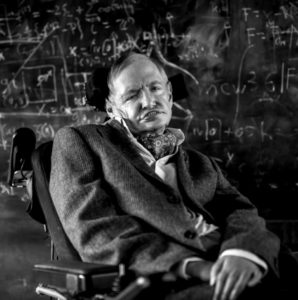Stephen Hawking: 1942-2018
World-famous physicist Stephen Hawking has died at the age of seventy-six. Hawking inspired the world with his scientific understanding of the universe, most notably his cosmological theories explained for a lay audience in A Brief History of Time, as well as for defying the odds that he would die a young man after being diagnosed with ALS, also known as Lou Gehrig’s disease.
Hawking was born on January 8, 1942—the 300th anniversary of the death of famed astronomer Galileo Galilei—and died on March 14, 2018—the day Albert Einstein was born in 1879 and the day we celebrate the mathematical constant known as Pi. Does this signal some kind of scientific magic at work or a delightful cosmic coincidence? Hawking’s own words perhaps best answer that question: “We are just an advanced breed of monkeys on a minor planet of a very average star. But we can understand the Universe. That makes us something very special.”
Hawking is himself very special to humanists both for his contributions to the understanding of the universe and for his disability outreach. He also very clearly promoted an atheistic view of the universe. In the Fall of 2014 at the Starmus Festival, a celebration of science, art, and music that was held in the Canary Islands that year, Hawking was asked to clarify some of his earlier conceptualizations of God and said:
Before we understand science, it is natural to believe that God created the universe. But now science offers a more convincing explanation. What I meant by ‘we would know the mind of God’ is, we would know everything that God would know, if there were a God, which there isn’t. I’m an atheist.
On an episode of the Discovery Channel show Curiosity that aired in 2011 called “Did God Create the Universe?” Hawking noted that humans were free to believe what they wanted and that in his view:
No one created the universe and no one directs our fate. This leads me to a profound realization. There is probably no heaven, and no afterlife either. We have this one life to appreciate the grand design of the universe, and for that, I am extremely grateful.
Stephen Hawking was the director of research at the Centre for Theoretical Cosmology at Cambridge University, an honorary fellow of the Royal Society of Arts, and the recipient of the US Presidential Medal of Freedom and countless other prestigious awards. He was the author or co-author of twelve popular science books and wrote over a dozen scientific films or documentary series, in addition to academic papers. Today, humanists and the world mourn the loss of a truly amazing human being.

